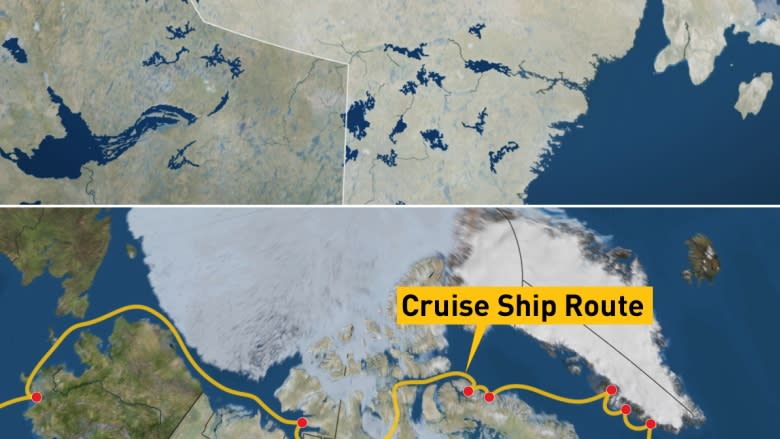Crystal Serenity brings sales boom to Nunavut artists? Not so fast
Some Inuit artists hoping to cash in on the huge influx of tourists on the Crystal Serenity this year were disappointed by the large number of American passengers — who have been banned from taking home seal and other marine mammal products since the 1970s.
Each year, the Nunavut Arts Festival brings together artists from across the Canadian Arctic to showcase their work and take part in workshops. This year's festival was in Cambridge Bay, coinciding with the arrival of the luxury cruise ship's venture through the Northwest Passage.
However, since 85 per cent of the cruise ship passengers were American, many artists were left out of the buying frenzy.
Bringing sealskins into the U.S. has been illegal since the Marine Mammal Protection Act of 1972.
"It's a big deal," says Rowena House, the executive director of the Nunavut Arts and Crafts Association.
"Fifty per cent of our artists use traditional materials in most of their work, which includes ivory [from narwhal and walrus] and sealskin," she added, both of which are banned from importation into the U.S. under the act.
House added that tourists were warned by the cruise operators about the ban.
The law does includes an exemption for Indigenous people — something Nunavut MP Hunter Tootoo took advantage of to wear a sealskin tie to the White House earlier this year — but few if any of the ship's passengers were Indigenous.
'It hindered my sales'
House says the ban definitely had an impact on sales.
She saw the purchase of a $600 one-of-a-kind doll interrupted when the American buyers noticed its sealskin mittens.
Much of the jewellery, she said, was passed over because it included ivory.
All in all, she estimates the artists lost thousands of dollars in sales because of the ban.
Sandra Rideout came all the way from Nunatsiavut to showcase her arts and crafts, predominantly made of seal products.
"Oh goodness, it hindered my sales," says Rideout, "I think I would have sold out at this sale if they were able to bring back sealskin."
Rideout said many of the American tourists she spoke to were confused and didn't understand why seals who were harvested sustainably by Inuit hunters were banned by their government.
'We've come a long way'
Inuit have long decried the U.S. sealskin ban — even with the Indigenous exemption — saying it unfairly vilifies the seal hunt and threatens the Nunavut economy.
Reviving the commercial market for sealskin products has been a priority for Nunavut since anti-sealing campaigns and the European Union's ban on seal products in 2009 caused pelt prices to plummet further.
Last year, the Government of Nunavut negotiated an exemption from the EU ban, which allows the import of seal products certified as harvested by Indigenous peoples.
- RELATED | Angry Inuk director Alethea Arnaquq-Baril hopes to change minds on seal ban
- RELATED | 'Angry Inuk' wins audience award and $25K prize at Hot Docs festival



